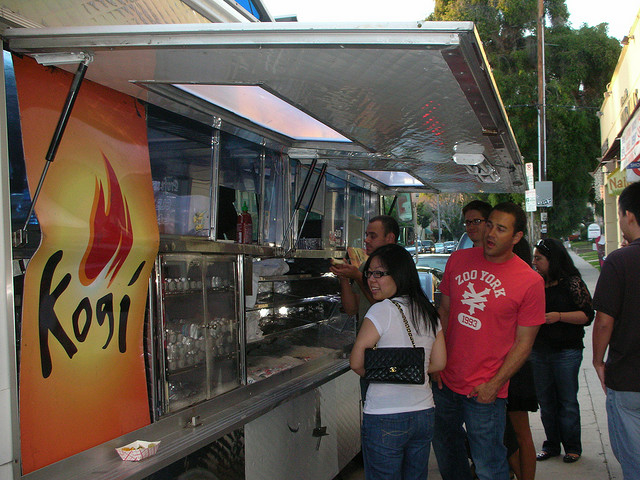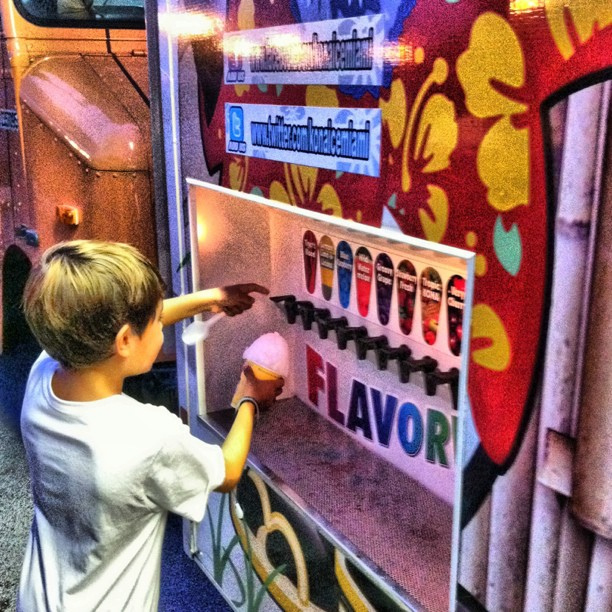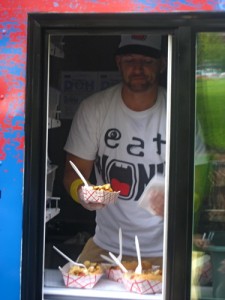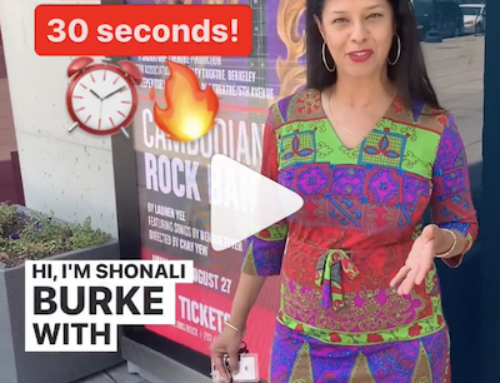Guest Post by Rachael Seda
I know, I know, the anticipation was killing you. Well it’s the day you’ve all been waiting for, the second part of my interview with entrepreneur and food trucker extraordinaire, Jeff Kelley!
(If you missed part one, then drop everything you’re doing and go read Reviving the Customer Experience – One Food Truck at a Time: Part 1 first. It’s ok, we’ll wait.)
Jeff already told us all about how he got involved in the food truck business, his marketing lessons and advice, what inspired him to start Food Truck Advisors, and how he thinks the food truck industry is reviving the customer experience.
Now it’s time to talk about the rise of the food truck phenomenon, its head-on collision with the explosion of social media, and how social changed the game.
Image: Courtesy of Jamie R. Liu
RS: Did you use social to promote your truck, and is social media a key element you advise your clients on?
JK: Oh absolutely. Social media is why food trucks exist, right? It’s why trucks exist in the format they exist today.
Before Twitter there really was no way to know where someone was serving from in real time. I mean you could say, “I think we’re going to be at this intersection.”
But what if there’s no parking? What if something goes wrong and you get a flat tire and you leave late from your commissary kitchen? There was no real way to tell people, and if you’re 15 – 20 minutes late and people have very limited lunch breaks, so it becomes irritating.
Twitter changed all that. Trying to build a Twitter following is a big part of social media strategy for food trucks and it affects the overall customer experience.
The social media outlet people use varies (Facebook, Twitter, etc.) but in Washington D.C., Twitter is really the root of all social media for food trucks.
Lesson: Social media allows you to connect and communicate with a large audience of people, but it also allows you to build a community and give your customers a more intimate experience. Use it to your advantage, be proactive and go where your audience is.
In an event of a crisis or unexpected event (like a food truck having a flat tire) having a timely, quick and effective way to communicate to your audience (aka a social media crisis plan) can mean the difference between losing loyal customers or strengthening their trust and loyalty to your business.
When did you realize you needed to incorporate Twitter as part of your own food truck marketing strategy?
When I saw how Kogi BBQ in California used Twitter; to leverage it as a resource to connect with people in a meaningful way, to communicate in real time their location or what was going on with their company.
 I didn’t really use Twitter before that; I didn’t really know how to leverage it so I had to learn.
I didn’t really use Twitter before that; I didn’t really know how to leverage it so I had to learn.
But it’s a combination of the relationships you build with foodies in the city, because they’re all on Twitter, right? They’re talking about their interests, their food reviews … it’s fascinating just watching them build relationships.
They all link back to their blogs and newsletters or even print media via Twitter; even the food writers from the Washington Post are active on Twitter.
So you really have to take this kind of integrated approach to ultimately get to what you want – which is a nice Twitter following which amounts to a group of regulars.
Image: sherrymain via Flickr, CC 2.0
Lesson: An integrated approach is key. Social media doesn’t mean you drop all traditional public relations, communication and marketing tactics, it means you must integrate a social media strategy into your overall communication and marketing strategy in order to be successful.
What do you think are some key marketing elements for success in the food truck industry besides what you may have already mentioned?
 Simple food, a distinctive concept, fun and engaging service, for starters. And it must be sustainable success.
Simple food, a distinctive concept, fun and engaging service, for starters. And it must be sustainable success.
One big “pop” because it’s a novel concept isn’t going to help; it must sustain itself over time. You could be stronger in one area and weaker in another, but if you nail all three then you’re going to hit it out of the park.
I also think timely response to customers is huge. Be aware that you’re under a microscope at all times, and you have to be engaged in constant communication on Twitter.
So if you’re going to put yourself into that world, you have to be responsive to people, you have to respond appropriately, and you have to remember that there’s always an open line of communication.
That means that you have to take responsibility, if you mess something up. There’s always going to be something you don’t do right – maybe the food wasn’t prepared properly for a particular customer or maybe you showed up late – you just have to own whatever it is.
If you show genuine concern and you handle it in an authentic way, the customers value that, and loyalty builds over time.
Image: miamism via Flickr, CC 2.0
Lesson: A good reminder to KISS (keep it simple stupid). And respond. Personally, there’s nothing more annoying to me then asking a question or reaching out to a business on one of their social media sites only to never receive a response (I refer to this as Business Type 2).
Would you have a phone in your business and never answer it? No. Well don’t be present in social media if you aren’t ready or prepared to respond to your customers.
Do you think the food truck industry is better at openly owning its mistakes on Twitter, compared to some other businesses or industries?
I think it’s easier to a large degree with a food truck [business] because there’s not much bureaucracy. Usually the owner is the operator, so their personality comes out. I know many of the food truck operators in the city personally, and I can tell you that regardless of their level of work experience or education, these are people who really care about their business.
They are passionate about it; this is their dream and every single day they have this vision that they’re communicating to the world through their actions and through their words.
I think people who are pursuing a dream like that, and have that kind of vision, tend to own their mistakes. They take responsibility for their actions and I think the food truck world does a very good job of that.
Lesson: If every industry/business/company was honest and took responsibility for their actions, I wonder what type of PR crises could be mitigated or avoided…? How can your business be more accountable? What processes must you have in place to make sure you can respond promptly and responsibly to customer concerns in the event that your business makes a mistake (and that time will come)?
What PR essentials do you think a food truck entrepreneur should know before they even enter the business?
 I think you have to understand that responsiveness is key, that authenticity is key and that you’re going to make mistakes and you just need to own them.
I think you have to understand that responsiveness is key, that authenticity is key and that you’re going to make mistakes and you just need to own them.
What pi**es people off is when you’re a hypocrite about something, when you don’t own something, right? We’re – as a nation – very forgiving.
When you’re under the spotlight (I liken it to being a celebrity because sometimes that’s how it feels as a food truck, like you’re under a constant microscope), you just have to recognize that and respond appropriately.
Be genuine about things. If you care about your customers then that’s going to come through. If you don’t that’s also going to come through, and you’re going to suffer the consequences.
Image: Dave Keeshan via Flickr, CC 2.0
Lesson: Again, own up and be honest. We all make mistakes; it’s how you respond to them that matters.
What’s the most important advice you’ve given to someone first starting out in this business?
Do your due diligence. Spend time researching the industry, researching the concept you’re interested in, researching trucks, every little element. You really need to take the time, because you can’t assume that you can start and run a business or learn on the fly. It’s going to be a nightmare if you do.
Be serious about it. Don’t just think you can start a truck as a second job and have a fulltime job as well; it’s not going to happen. It’s a full day. You can make a living out of a truck; and you’re going to be exhausted at the end of the day, physically, mentally and creatively.
It’s tough work; but what makes it worth it is that at the end of the day you’re out there fulfilling your dream and communicating the passion that you put into this to your customers. But make no mistakes, it’s very hard and I always tell that to people right off the bat when I meet with them.
It’s very, very hard, and know that going into it.
It’s like a mini restaurant.
It is, except [it’s on] on wheels so there’s so much more you have to worry about. There are so many more moving pieces.
Lesson: Oh research, most people dread it but it’s important to do your research no matter what career path you want to pursue, what company you’re interviewing with, or who you’re meeting with. The Internet and social media have given us an abundance of resources at our fingertips.
If you don’t take advantage of that and do your research, you will end up losing out to someone who did. And if you’re interested in starting your own food truck check out Jeff’s ebook, The Food Truck Truth.
What surprised you most about my conversation with Jeff Kelley? Is there anything else you wish I would’ve asked him? I’d love to hear your thoughts. And if you don’t have any thoughts (!), perhaps you could share your favorite food truck experience with us… what made it memorable?
 Rachael Seda grew up barefoot in Hawaii. Determined to find a career that put her creativity and social skills to good use, she double majored in communication and media arts and design at James Madison University and set out to do just that… and is now an Account Executive at CRT/tanaka. She shares her career experiences and journey at rachaelseda.com. Her ultimate weakness is cheese.
Rachael Seda grew up barefoot in Hawaii. Determined to find a career that put her creativity and social skills to good use, she double majored in communication and media arts and design at James Madison University and set out to do just that… and is now an Account Executive at CRT/tanaka. She shares her career experiences and journey at rachaelseda.com. Her ultimate weakness is cheese.






![[EVENT]: PR Hacks for Small Biz (online)](https://shonaliburke.com/wp-content/uploads/2021/06/FB-Ad-1200x800-01-01-01-Copy-500x383.jpeg)



@adamtoporek @earn_traffic Thanks do much for sharing @rachaelseda #WUL food truck post!
@shonali @adamtoporek @earn_traffic yes thank you all!
@rachaelseda @shonali My pleasure Shonali/Rachael! I really enjoyed it!
@CraigMcBreen @shonali thank you! Have a great weekend!
@craigmcbreen Thank you so much and for sharing @rachaelseda #WUL post!
@shonali @rachaelseda You’re welcome! Have a great weekend.
@TabithaEdwards Thanks so much for sharing @rachaelseda #WUL post!
@shonali @TabithaEdwards @JavierArronis Yes, THANK YOU!
@JavierArronis Thanks so much go sharing @rachaelseda #WUL food truck post!
@shonali @rachaelseda You´re very welcome! Happy Friday & weekend!
Great to see their success using social. Very cool.
These trucks are springing up everywhere in Seattle. Lebanese, Caribbean, Hawaiian, there’s more and more to choose from each year. Love this movement!
Maximus Minimus a truck designed with distressed-metal that looks like a giant pig. Very cool! And pulled pork is their thing … ;)
Is that a no Shonali?! ;)
Heh!
I love the food trucks in D.C. Eat a hot dog for me, please. :-)
I love the food trucks in D.C. Eat a hot dog for me, please. :-)
I love food trucks! Great post Rachael. Social is a must I think when it comes to food trucks. I went on a local brewery tour in Chicago about a month ago…it’s a REALLY small brewery so they called a food truck to come during the tour so people would have something to eat an no one would get TOO intoxicated. It was Duck n Roll (http://www.ducknrolltruck.com/) and their food was amazing! It’s basically Asian inspired tacos. What made me super happy was they had a vegetarian option…they gave me their card (with all their social networks listed so I could find them again), were super friendly and had delicious food. What more could I ask for?!
@yvettepistorio YUM! What a great idea. I’ve seen food truck weddings too which I think is so fun! Thanks for commenting Yvette. The next time we hang out we must do a food truck tour ;)
@rachaelseda We should just do a food tour…I’ll fast the week before so we can eat everything we want ;)
@yvettepistorio Deal me too! ChiTown Food Tour ;)
Great point on remaining sustainable. Nice post @rachaelseda!
@amsettle Thanks Ash and thank you for the comment!
Food Trucks = Best thing about D.C.!!!! Keep it up!
@z_i_n_g I know VA Beach/Norfolk needs to catch on. Maybe we should start one Chelsea…a cheese one!
Dangerous reading these food truck interviews in the morning. It’s only 10:30 and I’m ready for lunch…
@Ricardo Pobre HAHA I know. Thankfully it’s almost lunch time now! I hope you have some food trucks nearby!
@lisagerber Thanks for sharing Lisa!!
@rachaelseda You’re so welcome. Have fun seeing @shonali today. :) awww.
@lisagerber Oh thanks you know I will ;) cc: @shonali
@rachaelseda @lisagerber Oh yes we will! I’m trying to convince @Luc_Mic to join too!
@shonali @rachaelseda @lisagerber Ahh! Sorry I couldn’t make it. What a day!
@Luc_Mic I know! Are you better today?
@shonali so far, but it’s only 9:15am! Lol.
@Luc_Mic True!
@Luc_Mic @shonali @lisagerber Aww next time!